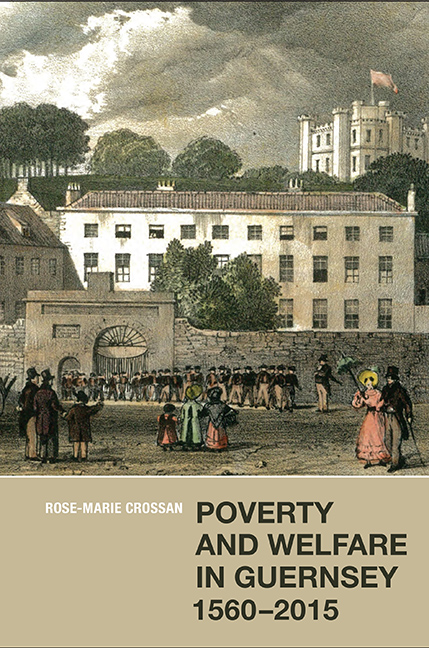Book contents
- Frontmatter
- Dedication
- Contents
- List of Illustrations
- Acknowledgements
- Abbreviations
- Conventions, Note on curren
- Maps
- Introduction
- I Context
- II Welfare
- III Town Hospital
- IV Twentieth Century and Beyond
- Conclusion
- Appendix 1 Writings on Peasant Proprietorship in Guernsey
- Appendix 2 Poor Rates, Indoor and Outdoor Relief Spending, St Peter Port, 1724–1924
- Appendix 3 Parochial Poor Relief in Other Channel Islands
- Appendix 4 Average Year-end Head-counts and Average Annual Admissions and Discharges, Town Hospital, 1700s–1900s
- Appendix 5 Adult Admissions Ascribed to Illness and Accidents, Town Hospital, 1852–1919
- Appendix 6 Relative Proportions of Men and Women in Year-end Head-counts and Annual Admissions, Town Hospital, 1750–1919
- Appendix 7 Annual Averages of Child Admissions and Year-end Numbers, Town Hospital, 1756–1919
- Appendix 8 Over-60s as a Proportion of all Inmates, and Composition by Sex of Over-60s Cohort, Town Hospital, 1756–1911
- Appendix 9 Average Weekly Amounts Purchased per Head, Town Hospital, 1760–1917
- Appendix 10 Timeline: Developments in Poor Relief and Social Security, 1700–2010
- Bibliography
- Index
Appendix 3 - Parochial Poor Relief in Other Channel Islands
Published online by Cambridge University Press: 18 June 2021
- Frontmatter
- Dedication
- Contents
- List of Illustrations
- Acknowledgements
- Abbreviations
- Conventions, Note on curren
- Maps
- Introduction
- I Context
- II Welfare
- III Town Hospital
- IV Twentieth Century and Beyond
- Conclusion
- Appendix 1 Writings on Peasant Proprietorship in Guernsey
- Appendix 2 Poor Rates, Indoor and Outdoor Relief Spending, St Peter Port, 1724–1924
- Appendix 3 Parochial Poor Relief in Other Channel Islands
- Appendix 4 Average Year-end Head-counts and Average Annual Admissions and Discharges, Town Hospital, 1700s–1900s
- Appendix 5 Adult Admissions Ascribed to Illness and Accidents, Town Hospital, 1852–1919
- Appendix 6 Relative Proportions of Men and Women in Year-end Head-counts and Annual Admissions, Town Hospital, 1750–1919
- Appendix 7 Annual Averages of Child Admissions and Year-end Numbers, Town Hospital, 1756–1919
- Appendix 8 Over-60s as a Proportion of all Inmates, and Composition by Sex of Over-60s Cohort, Town Hospital, 1756–1911
- Appendix 9 Average Weekly Amounts Purchased per Head, Town Hospital, 1760–1917
- Appendix 10 Timeline: Developments in Poor Relief and Social Security, 1700–2010
- Bibliography
- Index
Summary
Bailiwick of Guernsey
Sark and Alderney
Throughout the period covered by this book, Sark and Alderney were under the nominal superintendence of Guernsey but enjoyed substantial administrative and legislative autonomy. In the sixteenth and seventeenth centuries, both were members of the Presbyterian Church of the Channel Islands and subscribed to the Discipline drawn up in 1576. It was this Discipline which embodied their original welfare arrangements, based on those prescribed by John Calvin in his Ecclesiastical Ordinances. After the imposition of Anglicanism on the Bailiwick in 1662, Sark and Alderney each became parishes in the Deanery of Guernsey. Their welfare arrangements then evolved in ways similar, but not identical, to those of the larger island.
At some point in the post-Anglican era, the deacons of Sark and Alderney's Presbyterian churches came to be known as Collecteurs. However, like their Guernsey counterparts, they continued to perform essentially the same duties with regard to the poor. Each island appears originally to have had four Collecteurs, but, by the time John Jacob wrote his study of the Bailiwick in the late 1820s, Sark's four had become two. Interestingly, at the time Jacob was writing, neither Alderney nor Sark appears to have had an officer bearing the title Procureur.
Initially, the Collecteurs of Sark and Alderney funded their welfare activities from voluntary sources such as church collections, donations and bequests. By at least the early nineteenth century, however, both islands had begun intermittently to levy taxes for the poor. As in Guernsey, islanders were assessed on the value of their capital assets, expressed in terms of wheat. The precise mechanics of taxation varied with each island. Beginning with Sark, we shall examine the systems of both islands as they operated during the nineteenth century.
Sark's sole legislative body was its ‘Chief Pleas’, and it was this body which determined whether or not a poor tax was needed and set the sum to be raised. A committee of Chief Pleas, composed of the principal inhabitants and known as the Douzaine, was responsible for drawing up the tax list and assessing the property of ratepayers. Sark's Constable, a minor officer concerned with public order, appears to have collected the tax. This procedure, followed in raising taxes for all communal purposes, was enshrined in an ordinance of 1899.
- Type
- Chapter
- Information
- Poverty and Welfare in Guernsey, 1560-2015 , pp. 280 - 289Publisher: Boydell & BrewerPrint publication year: 2015



